GaHee Park (b. 1985) explores socially
taboo or forbidden themes related to sexuality, nudity, and the female body
through her own unique perspective in painting. In her works, these subjects
are depicted as intimate scenes from everyday life. The figures in her
paintings, often portrayed in the nude, engage in private acts between lovers,
yet they appear completely unbothered by the gaze of others, freely enjoying
their daily moments.
The secretive and private scenes in Park’s
paintings and drawings create a sense of discord, as disparate elements
intertwine or appear in distorted forms, unsettling the viewer’s perception and
stimulating the imagination.
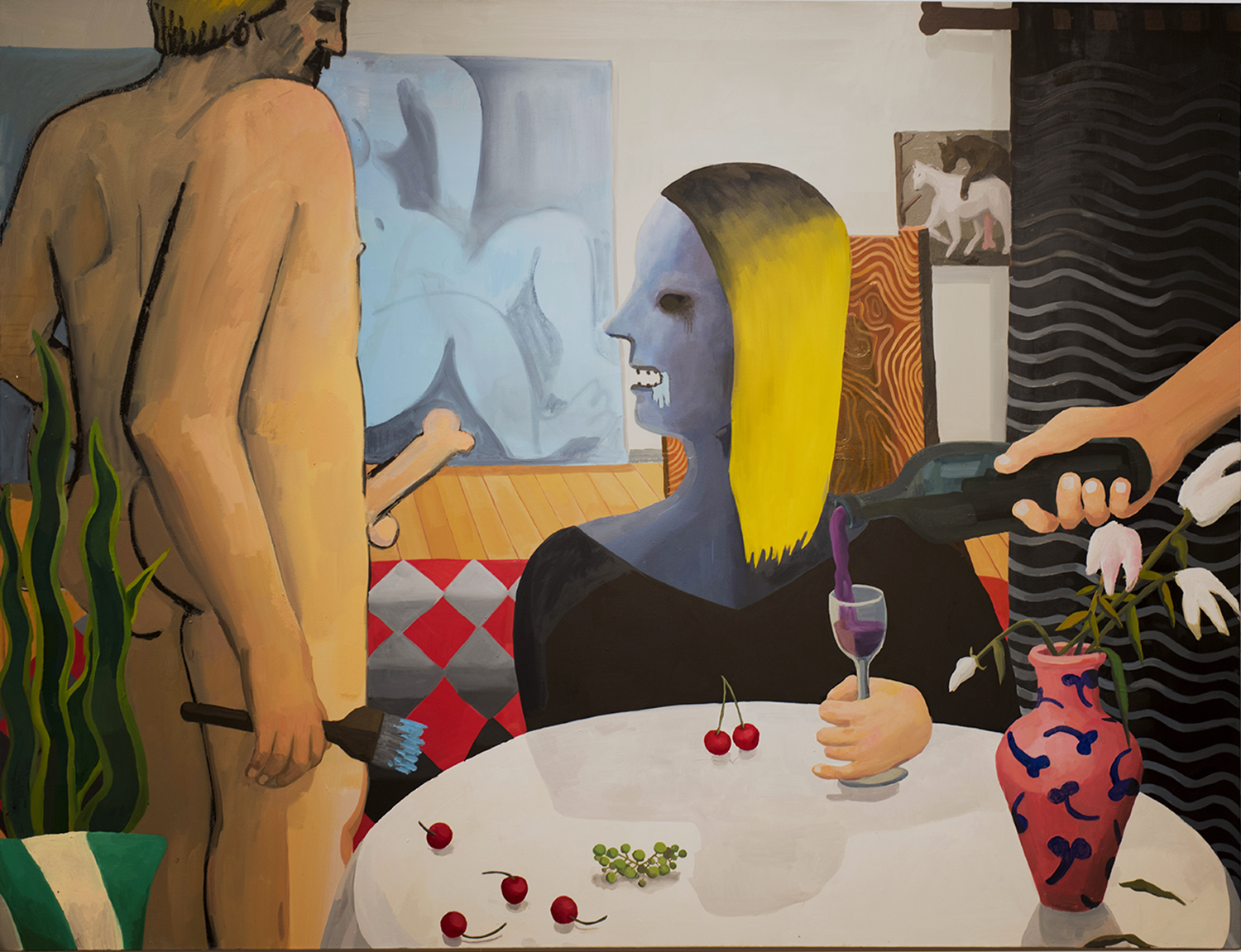 GaHee Park,
Studio Visit, 2015, Oil on canvas, 165.1x215.9cm ©GaHee
Park
GaHee Park,
Studio Visit, 2015, Oil on canvas, 165.1x215.9cm ©GaHee
ParkAs a child, GaHee Park grew up in a
religious and strict household within a society that enforced conformity. These
early experiences instilled feelings of guilt and shame regarding sexual
expression. However, after leaving Korean society and settling in the
unfamiliar environment of the United States, she began to break free from the
constraints that had once confined her.
During her time in college in the U.S., she
was deeply influenced by the freedom of self-expression among women and
feminism, both of which became fundamental to her artistic practice. Later, at
the Tyler School of Art, Philadelphia, Park expanded her exploration of the
female body, incorporating it more freely into her work.
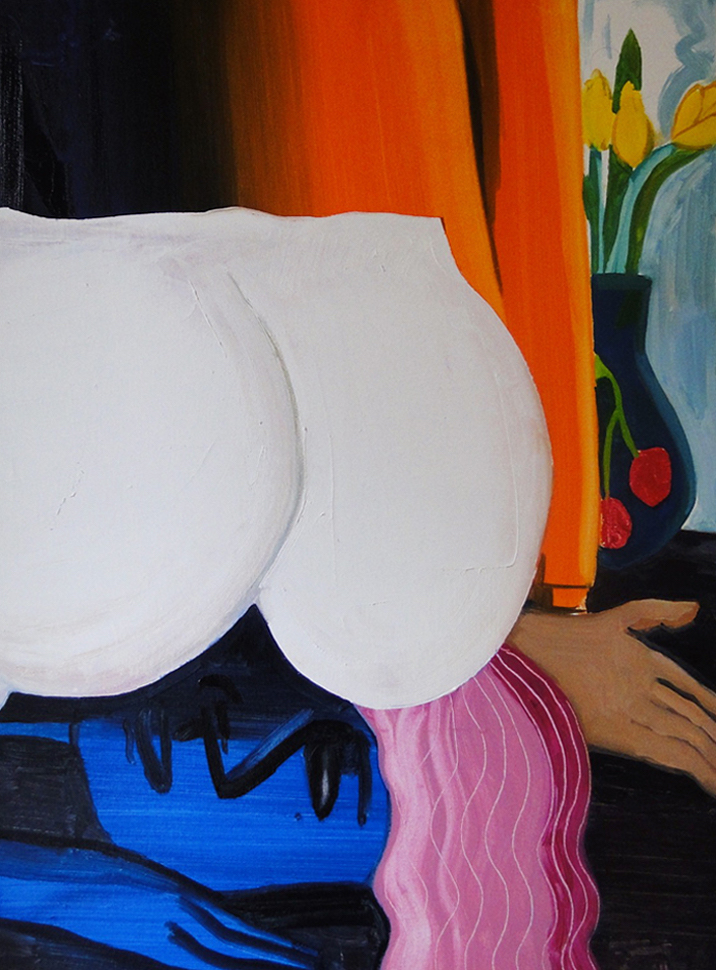 GaHee Park,
Butt on Face, 2016, Oil on canvas, 60.96x50.8cm ©GaHee Park
GaHee Park,
Butt on Face, 2016, Oil on canvas, 60.96x50.8cm ©GaHee ParkDrawing from her experiences growing up in
a conservative and oppressive environment, Park’s early works reveal a more
direct exploration of erotic elements. Her work serves as both a form of
self-expression regarding repressed sexuality and a commentary on the power
dynamics intertwined with it.
A notable example is her 2016 series ‘Butt
on Face’ (2016), which depicts a scene where a naked butt presses down on a
woman's face. The sexual act portrayed in this work is presented through an
asymmetrical and hierarchical power structure.
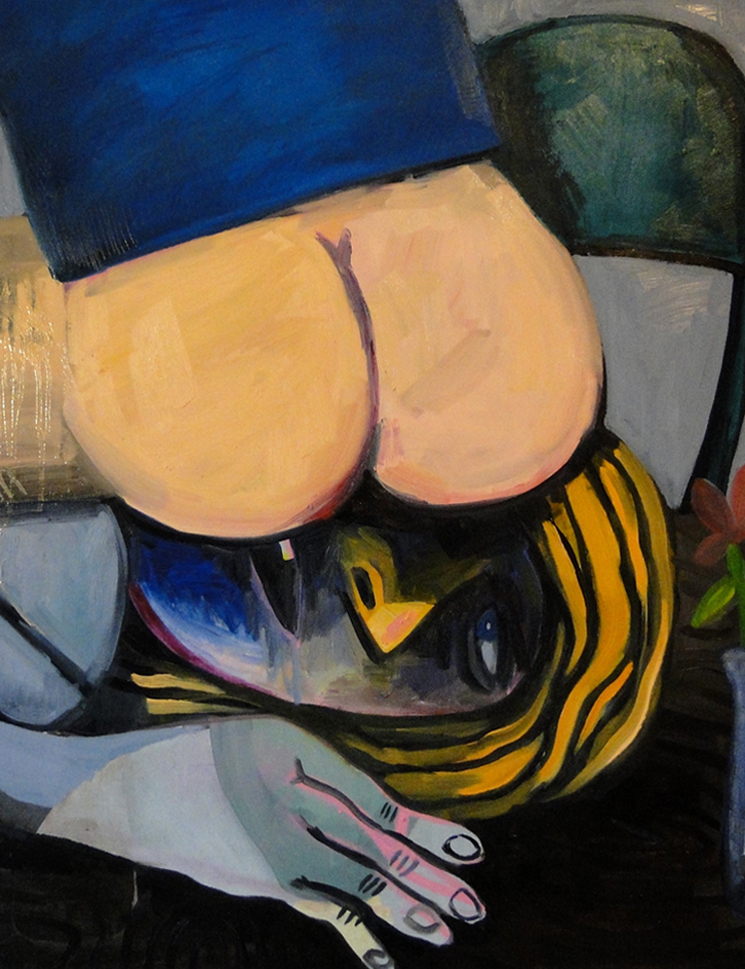 GaHee Park,
Butt on Face, 2016, Oil on canvas, 60.96x50.8cm ©GaHee Park
GaHee Park,
Butt on Face, 2016, Oil on canvas, 60.96x50.8cm ©GaHee Park‘Butt on Face’ explores the inherent power
dynamics tied to sexuality in a bizarre and somewhat humorous manner. Rather
than presenting eroticism purely as something sensual, the work satirizes the
power structures embedded within it, ultimately taking an anti-pornographic
approach.
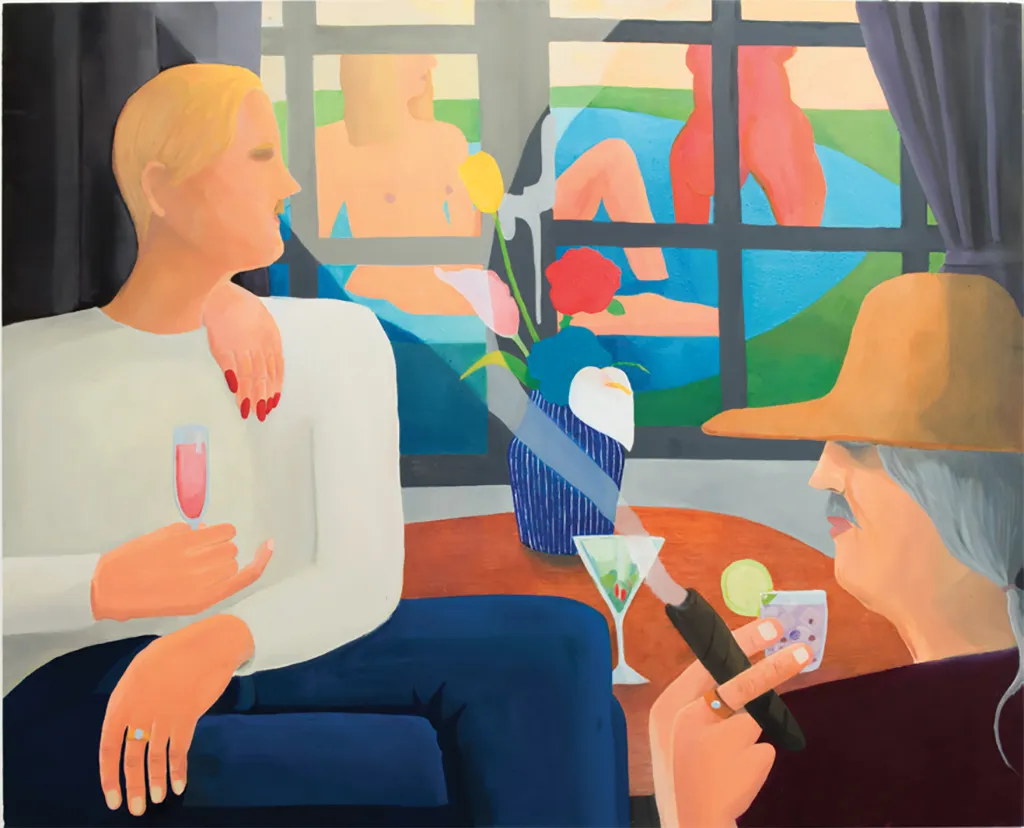 GaHee Park,
Family Jewels, 2016, Oil on canvas, 121.92x152.4cm ©GaHee
Park
GaHee Park,
Family Jewels, 2016, Oil on canvas, 121.92x152.4cm ©GaHee
ParkAlongside this, GaHee Park has also created
works that address the male-centered gaze imposed on the female body. This
theme originates from her experience of viewing Paul Gauguin’s nude paintings
of young Indigenous girls in Tahiti. Through these images, she recognized how the
female body was othered by the gaze of a white male artist and drew parallels
to the sexism and racism she had experienced as an Asian woman in Western
society. In response, Park sought to depict the female body in her own visual
language as a non-Western woman.
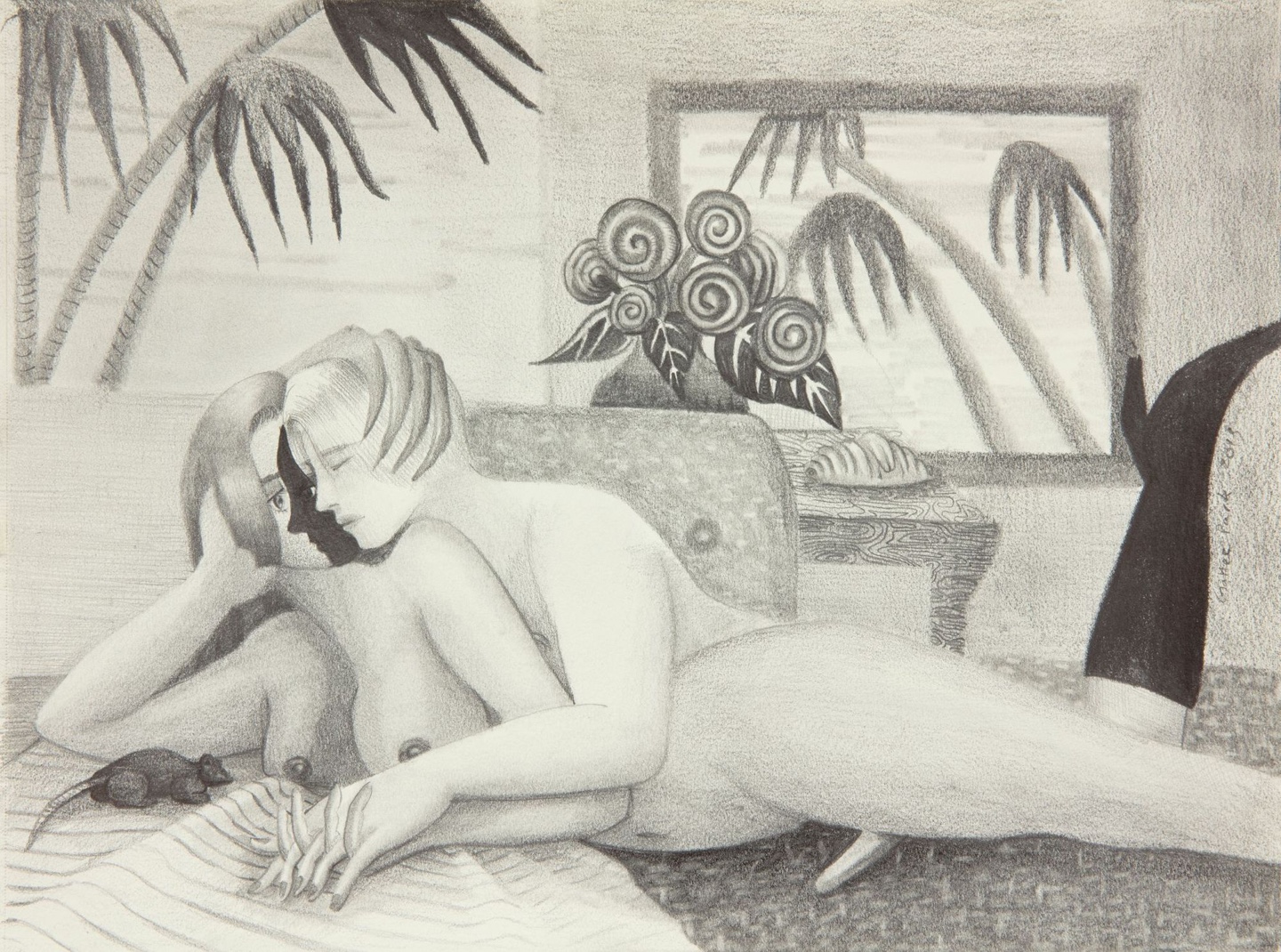 GaHee Park,
Shadow Kiss, 2019, Pencil on paper, 22.9x30.5cm ©Perrotin
GaHee Park,
Shadow Kiss, 2019, Pencil on paper, 22.9x30.5cm ©PerrotinWhen depicting the female nude, GaHee Park
chooses to move beyond societal taboos and instead focus on the pure joy of
women—particularly their sexual pleasure. She seeks to dismantle both the
notion of taboo and the objectification of the female body, bringing to light
desires that have long been hidden or suppressed.
In her work, the female nude is portrayed
as an active subject, engaging in intimate moments with a loved one in private,
everyday spaces—completely unbothered by the gaze of others. Unlike in
traditional art history, where the female body has often been rendered as a
passive object of sexual desire, Park’s women appear relaxed and free,
embracing their lovers, lounging, or sharing a meal, naturally immersed in
their daily lives.
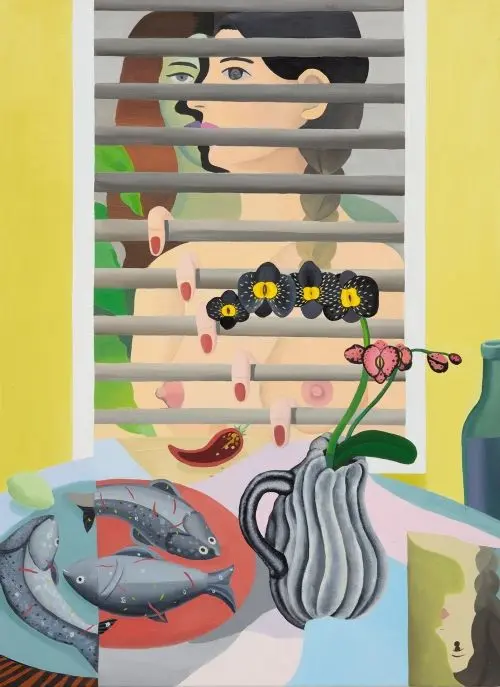
GaHee Park, Window of Time, 2019, Oil on canvas, 121.9x88.9cm ©Perrotin
While based in New York, GaHee Park held
her first solo exhibition in Korea, 《We Used to Be Fish》, at Perrotin Seoul in 2019. The works featured in this exhibition
explored women's desires in everyday life, blending the artist’s personal
experiences with imagination.
Her paintings evoke a surreal quality, as
if shifting between dreams and reality. Elements within the compositions often
appear slightly misaligned, like puzzle pieces that don’t quite fit, or they
intertwine multiple times and spaces simultaneously, stimulating the viewer’s
senses.
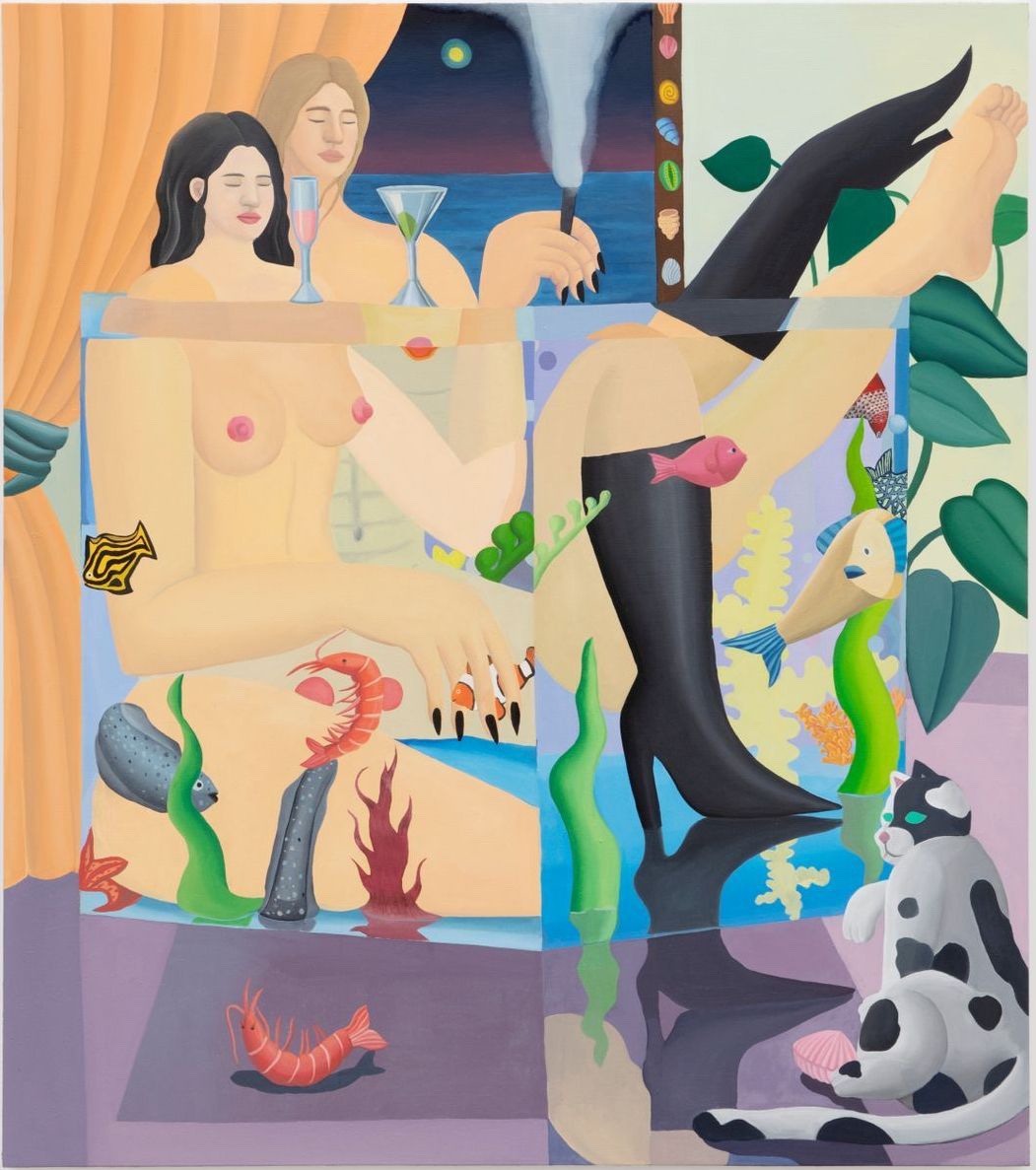 GaHee Park,
We Used to Be Fish, 2019, Oil on canvas, 152.4x172.7cm ©Perrotin
GaHee Park,
We Used to Be Fish, 2019, Oil on canvas, 152.4x172.7cm ©PerrotinThese images emerge as Park translates her
imagination and fragments of everyday observations into visual form. For
example, her painting We Used to Be Fish (2019), which also
served as the exhibition’s title, was inspired by a memory of reading a piece
of fake news online claiming that humans were originally fish based on fossil
research.
While recounting this story to her husband,
Park was unable to find the original article and instead began to speculate and
imagine its contents as she explained it. That night, she dreamt of herself
inside a fish tank, her body distorted by the glass. Fascinated by this surreal
image, she used it as the basis for the painting.
 GaHee Park,
Early Supper, 2019, Oil on canvas, 116.8x152.4cm ©Perrotin
GaHee Park,
Early Supper, 2019, Oil on canvas, 116.8x152.4cm ©PerrotinIn this way, the artist combines everyday
experiences and imagination related to the body to create images, often
intertwined with the anti-pornographic approach seen in her earlier works.
Her paintings frequently feature women with
exaggerated body parts, such as lips and fingers resembling spider legs. For
instance, one striking image shows a grotesque hand with long, painted nails
grasping a genital area beneath a table, or feeding a cat.
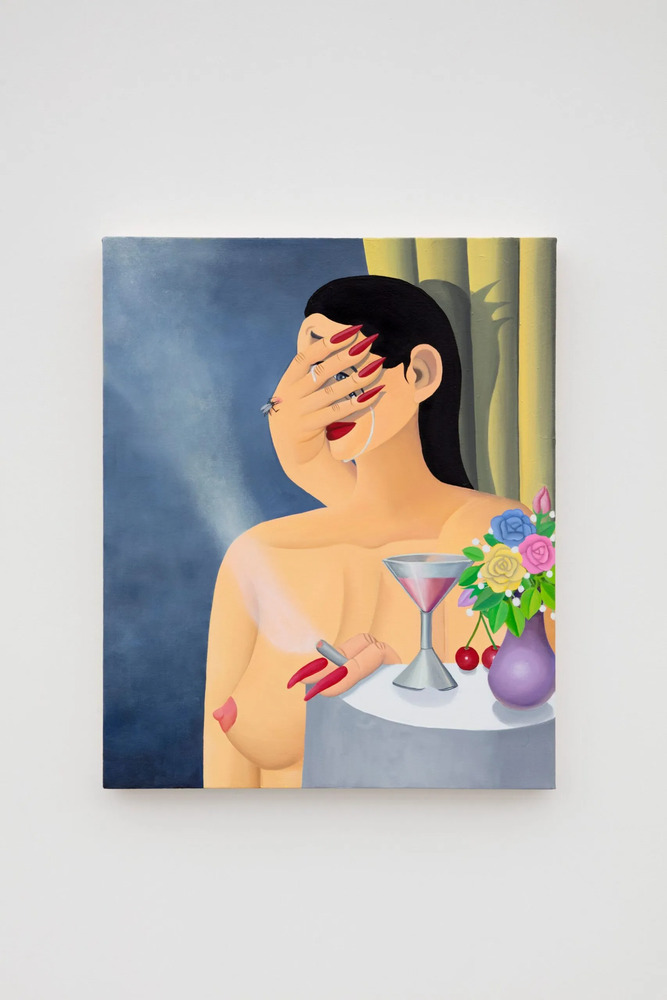
GaHee Park, Betrayal (Sweet Blood), 2020, Oil on canvas, 68.6x55.9cm ©Perrotin
The artist explains that through the
somewhat grotesque hand, she aims to challenge the stereotype that "Asian
women are quiet and submissive." She wanted to convey that women, too,
possess the strength to reach out and grasp what they desire, defying the
limitations imposed by such prejudices.
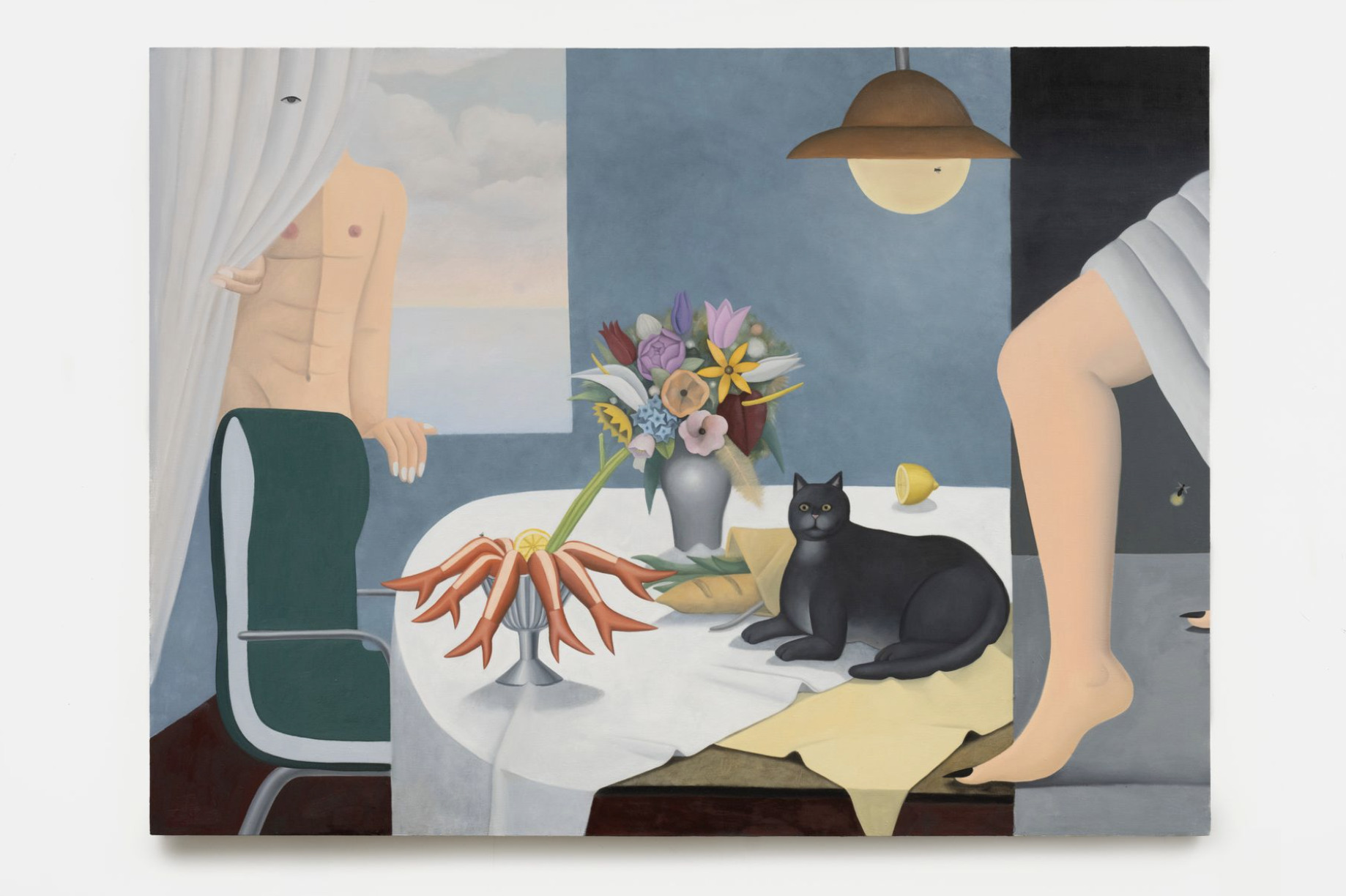 GaHee Park,
World of Tails, 2023, Oil on canvas, 170.2x228.6cm ©Perrotin
GaHee Park,
World of Tails, 2023, Oil on canvas, 170.2x228.6cm ©PerrotinIn this way, GaHee Park doesn't directly
expose taboo topics like female desire but instead reveals them in a more
everyday, indirect manner. The ambiguity created by these elements plays a
crucial role in her work. She describes her approach as one that combines a
search for beauty with a need to probe ‘the things we don’t talk about’.
In her recent works, fragmented time and
space, along with the body, appear only in parts. Park suggests that for the
meaningful liberation of "civilized" pleasure and restraint, a
willful subversion of social norms and taboos is often necessary. This process
manifests in her work through unnatural compositions and physical distortions
of the body.
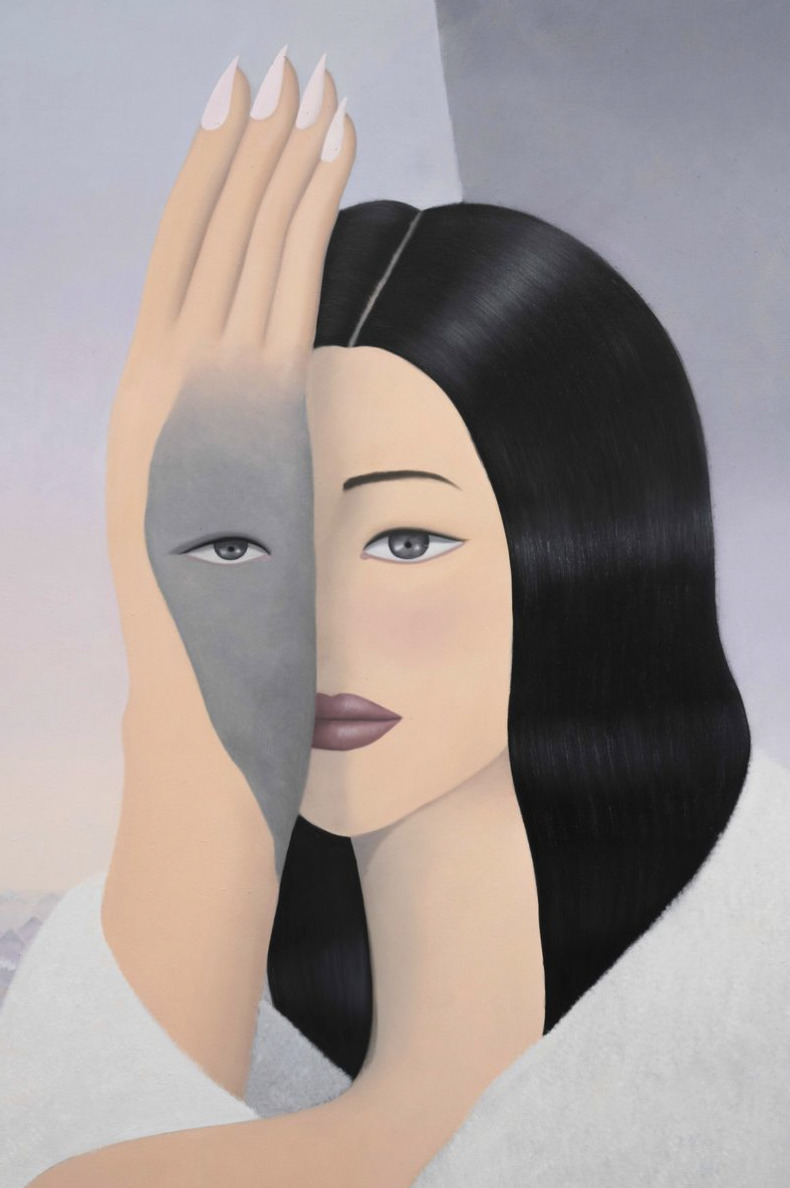 GaHee Park,
Woman on a Beach at Dawn, 2024, Oil on linen, 203.2x172.7cm ©Perrotin
GaHee Park,
Woman on a Beach at Dawn, 2024, Oil on linen, 203.2x172.7cm ©PerrotinIn this way, GaHee Park redefines what has long been considered taboo, particularly female desire, by expressing it freely within the most everyday and private spaces, turning it into a natural instinct and a part of daily life. For the artist, who grew up in a strict Catholic household, painting becomes a form of personal catharsis and a space for exploring and expressing an idealized eroticism that is free from the gaze or desires of male.
"Expressing women's pleasure, especially
sexual joy, was long seen as taboo, but I made the decision to break that
history and now express it. In New York, where I live, and in the global art
world, there’s a trend and movement to dismantle those taboos and
objectification, and we are right in the middle of it." (GaHee Park, Elle
interview, December 19, 2019)
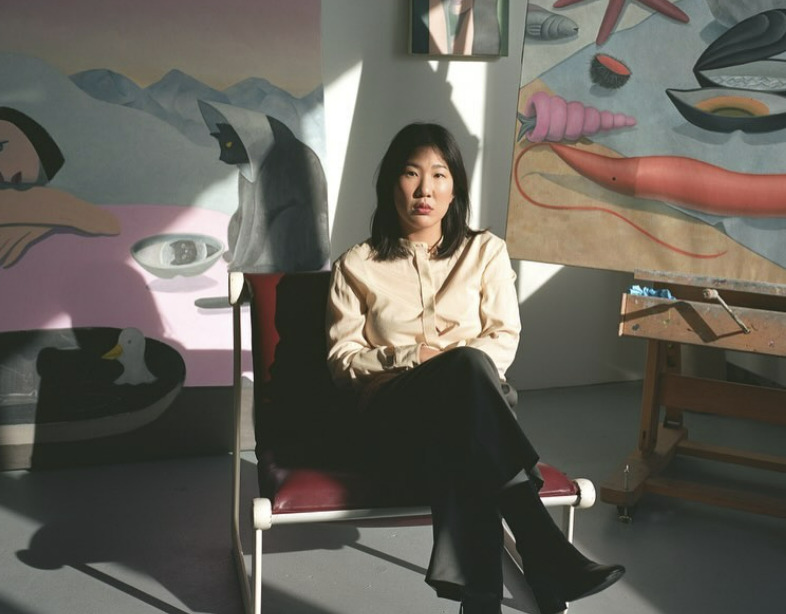
Artist GaHee Park ©Perrotin
GaHee Park earned her BFA in Painting from the Tyler
School of Art in Philadelphia and her
MFA in Painting from Hunter College in New York. She is
represented by Perrotin, with solo exhibitions at Perrotin’s New York (2024,
2020), Tokyo (2023), Paris (2021), and Seoul (2019) locations. She has also
held solo exhibitions at Taymour Grahne in London (2018), Motel in Brooklyn
(2017), 2nd Floor Gallery in Brooklyn (2016), and Marginal Utility Gallery in
Philadelphia (2015).
Park has participated in numerous group
exhibitions, including 《From the Collection》 (Nassima Landau, Tel Aviv, Israel, 2025), 《The
Imaginary Made Real》 (Berry Campbell, New York, 2023), 《Beyond Identity》 (Jessica Silverman, San
Francisco, 2022), 《No Patience for Monuments》 (Perrotin, Seoul, 2019), and 《Cheeky:
Summer Butts》 (Marinaro Gallery, New York, 2018).
Her works are housed in collections such as
The Pond Society (Shanghai, China), Columbus Museum of Art (Ohio, USA), and the
Institute of Contemporary Art, Miami (Miami, USA). In addition, Park will participate
in a public art project at New York's John F. Kennedy International Airport's
Terminal 6, scheduled for completion in 2026.





















